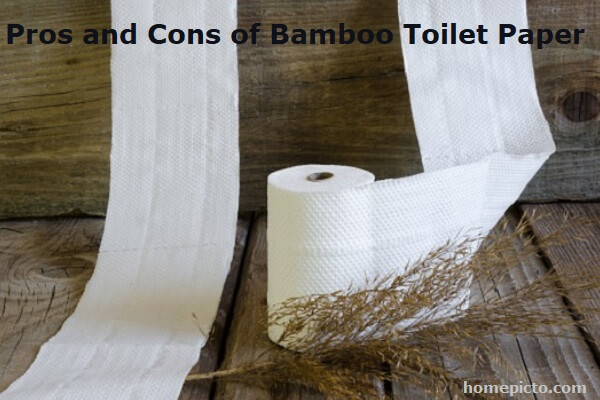Most people use toilet paper daily without considering how it affects the environment. To have something soft to wipe with, though, millions of acres of trees have been cut down.
Bamboo toilet paper is one of the best and most environmentally friendly substitutes, aside from bidets. The advantages and disadvantages of this relatively new concept are examined below.
Bamboo toilet paper is a viable substitute for virgin and recycled toilet paper. While still providing soft and usable toilet paper, this substitute is supposed to be more environmentally friendly. But what advantages can bamboo toilet paper offer? And does this rather contemporary interpretation of the time-honored classic have any flaws?
As listed below, bamboo toilet paper is a green, sustainable product with many advantages.
Bamboo is the fastest-growing plant; some species may grow up to 3 feet in a single day. While most species develop slowly, they expand more quickly than hardwood and softwood trees. A replanted tree may not be ready for harvest for up to 50 years. It just takes five years for bamboo to be ready for harvest.
Chlorine is used in the toilet paper manufacturing process as a bleaching agent and in perfumes to enhance the paper's odor. It implies that the chemicals come into contact with our most delicate organs and are flushed down the toilet and into the water supply. Most bamboo toilet paper employs natural alternatives or doesn't use any bleaching or fragrances.
Bamboo is a hardy plant that can be grown in various temperatures and situations. It also grows quite quickly. It can be grown on five of the world's eight continents.
The bulk of toilet paper is flushed down the toilet and ends up in the sewage or septic system. Even though it is said to be recyclable, this rarely occurs. Recycling toilet paper is a labor-intensive process that necessitates thorough cleaning. It uses a lot of water and electricity. Since bamboo toilet paper is entirely biodegradable, recycling is not required because it decomposes in the water of a septic tank or sewer system.
When huge forest areas are cleared for toilet paper production, it destroys habitats, including the breeding and nesting grounds of many animals. There is minimal to no harm to animals because bamboo used to make toilet paper is not the same species that pandas eat.
Since bamboo has short roots and grows very densely, it can establish a big colony in a limited space. Bamboo is used to make garments and other products because its fibers are exceptionally soft.
Bamboo is antimicrobial. Since it is immune to many insects and illnesses, it is advantageous for the plant as it grows. Because it can keep us clean and help protect our bodies and skin, it is also advantageous when used as toilet paper.
Customers who care about the environment are increasingly choosing bamboo toilet paper; however, this product has some drawbacks.
Since bamboo toilet paper is still relatively few businesses manufacture it. Comparatively, toilet paper made from trees has been produced for at least 150 years, during which time the procedure has been improved, and the price has dropped.
Although prices are falling, bamboo toilet paper is still more expensive than conventional and even recycled toilet paper options.
Similarly, the product is still very new; therefore, there aren't many companies producing it, and those that do are highly specialized. Finding this product can be challenging, especially in stores and supermarkets. You might have to order it online and send it to your house.
Bamboo is recognized as the world's fastest-growing plant in the Guinness Book of World Records. Some species can grow up to 35 inches per day or 0.00002 miles per hour. Even though the plant is typically regarded as mature once it reaches a height of 7 feet, the tallest bamboo plant ever recorded was 130 feet high.
Because they won't grow back after being cut down, the trees used to make traditional toilet paper must be replanted. Bamboo may grow back on its own and does not require the same kind of replanting.
Because of its inherent qualities, bamboo does not require chemical treatment during processing. It indicates that bamboo toilet paper is made without chlorine or other bleaches.
Conclusion
The fastest-growing plant in the world, bamboo, is a better source of toilet paper for the environment than hardwood and softwood trees. It can grow up to three feet per day, forms dense colonies, and doesn't need other chemicals after harvesting to remain soft and safe for human usage. Even though bamboo toilet paper is typically more expensive and harder to find than alternatives made of trees, it is becoming more widely available and less priced.

Yes, without a doubt, is the quick response. The performance of bamboo toilet paper is superior to other types. Bamboo bath tissue is more absorbent than virgin pulp and recycled pulp. The least soft toilet paper is typically recycled.
The eco-friendly goods that fit well with your sustainable way of living are frequently more expensive than their equivalents from the budget store. There is no getting around the fact that bamboo toilet paper is typically more expensive than regular products made from trees.
Avoid companies whose names contain the word plush. Although your posterior might love the treat, your septic system may be more susceptible to clogging. Look for the word rapid-dissolving on the label regardless of the product's thickness. Think about using recycled toilet paper, which is excellent for the environment and won't harm your septic system.
Bamboo toilet paper is frequently more expensive than toilet paper made from trees. If you're looking for a biodegradable option, bamboo toilet paper might not be the greatest choice because it decomposes more slowly than recycled paper.